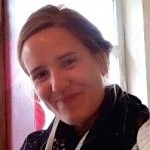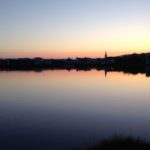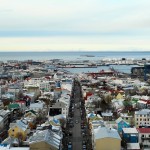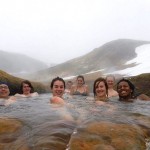 Anna Marcelle Van Rensburg
Anna Marcelle Van Rensburg
Flinders Degree: Bachelor of Commerce (Finance/Economics)
Program: Semester exchange Semester 1 2016
Destination: University of Iceland
“I think that overcoming the difficulties I faced along the way beforehand and during, and being so completely independent and self-sufficient and solving my own problems was personally very rewarding. However, the people I met and connected with and the friends I made was also an incredibly rewarding aspect of the exchange”.
Highlight
I had so many amazing experiences! A particular highlight would be when other exchange student friends and I rented a car for a day to hike up to the Reykjadalur hot springs. The weather was absolutely miserable but we couldn’t not go since we’d rented the car. So we hiked up the mountain in snow and sleet and rain and gusty winds, and changed into our bathing suits there on the unsheltered deck next to the hot spring. And once we were in it was lovely! And then we had to get back out again… It was such an adventure and so miserable but so much fun and something I’ll never forget.
Before You Go
I was very worried that I wouldn’t make any friends and I’d be watching Netflix and doing the same things I do in Australia every night over there. I was worried that I wouldn’t be able to cope with being away from my family and my home for so long. It really is pretty much impossible to not make friends on exchange, and while I did watch a lot of Netflix, sometimes it was with my new friends, and I did also go to many concerts and plays and events. I can also say that I made it through the entire experience just fine. I did experience homesickness and missed my family a lot, but I got over it.
Orientation
- The International Office from Háskóli Íslands (HÍ) emails exchange students a link to their pre-orientation presentations covering registration, their intranet (Ugla), and other University services a month or so before the semester starts.
- Similar to Flinders Uni, they also have an orientation week before the semester kicks off for all international students. Firstly, there’s a welcome reception, where the International Office’s key staff is introduced, the university and its workings are also outlined, and the credit system and course catalogue are explained. The support services offered and where and how students can access them are also introduced. There are lots of icebreakers and mingling between the students with some typical Icelandic snack foods given and the aim is to help students adjust to the new culture and surroundings. There are also several walking tours of the campus given, which was a bit difficult in the snow and on the icy footpaths in the first week of January.
- The university is set out straightforward once you have your head around the different campuses, which depends on the faculty or school. It is also much smaller than Flinders Uni. Each school also has their own welcome meeting to introduce the teaching staff, distribute timetables for all courses taught in English in that school, and introduce students in the same field to each other.
- There is also a crash course given for very basic Icelandic. There are also some events organised by the Student Council. Most students also met their mentors if they had signed up for one during the welcome reception or during that first week. I met mine during the second week.
Study Life
- I did 34 ECTS or five courses, where the typical load per semester is 30 ECTS, and I had to do two graduate level courses, so I was quite busy with study throughout the semester. My undergraduate courses were all taught in English and their material was not especially challenging in comparison with topics offered by Flinders. The lecturers were quite lenient in their assessment, I think it’s because there were so many students whose first languages weren’t English, so the courses needed to be worthwhile and of value but still simple. Their workload wasn’t as full on, with smaller assessment pieces, like short oral presentations and online homework pieces and assignments, due throughout the semester mostly. A larger oral presentation, and group assignment report and presentation were the more major assessment pieces and they didn’t take too long to complete. There were also readings to do every week to prepare for class discussion and participation, and if you hadn’t done them you couldn’t really engage on the same level. I wasn’t worried about these courses, it was just a matter of getting the work done.
- My two graduate level courses were challenging and of similar difficulty as Flinders’ topics that I’ve done in the past. There were homework assignments and readings to do every week, but their assessments were tougher in that only 10% of the final grade depended on assignments and 90% depended on a four-hour exam held in a computer room for the one course, and there was a 40% presentation on a case study without any additional written report on the presentation’s appendices and 50% 48- hour home exam in the other.
- HÍ [Háskóli Íslands] had great facilities with plenty of study space and computer rooms everywhere, and most of the university was accessible through corridors so students didn’t even have to step out into the cold outside. They also had a gym with a really affordable price for the semester. Apart from the schools’ timetables and a pointer to the university website and intranet, no additional resources were given to exchange students.
Housing
- I initially had some problems with my accommodation, because I got so intimidated by the student housing process, what was and wasn’t included and how to go about securing it, and the fact that I needed housing for my student permit, so I booked a room through AirBNB, which wasn’t very close to the university, the host wasn’t there to sign my housing certificate and provide witnesses, the wifi gave out two days into my stay, and the other guests weren’t clean or quiet.
- Luckily, a Dutch exchange student whom I’d met at the welcome reception was considering a new apartment on the same street as the university and wanted another person in the house to split the cost of the wifi with. We moved in at the end of that first week. Many other students were doing the same thing that first week, looking at rooms and asking around while staying in a hostel. Our apartment was definitely more ‘luxurious’ than the student housing, with all furniture, bedding, and essentials provided, I got my own room, and we had our own kitchen and bathroom. And I feel like I luckily still got the uni student housing experience as I lived with another student, but also met more different people as our other housemate was interning in Reykjavík. The cost of the room was around the cheapest you could find in Reykjavík. I would recommend this, but I think I got very lucky, and student housing may be really comforting and offer some additional support in a new country. This may also be difficult in the Autumn Semester, when the city is inundated with tourists and rent goes up a bit.
Money Matters
- Housing Cost
AU$600-$800 per month for self-catering facilities.
- Living Expenses
Around $6,811 is what I budgeted, which doesn’t include my flights or visa and insurance costs. I spent a little bit less than this, but I made sure to overestimate as I knew the cost of living in Reykjavík was higher than Adelaide.
Financial assistance
I received an OS help loan of $6,362 and a $1,000 RA Simpson scholarship.
Lifestyle
- Typical Day
I’d wake up and have breakfast and either finish up some reading, go over a homework paper, or just message my friends back home whose day had pretty much ended. I’d have tea with my housemate and then get ready to head off to uni – a 20 minute stroll but I had to manage my time to account for the additional 15 minutes it took to put on socks, shoes, scarf, coat, and hat and gloves, and grab the stuff I’d need, there were no quick runs out. There weren’t really any formal lectures, all classes were held more like workshops or tutorials, but they typically run longer. After class, I’d get a snack from the canteen and do some work in one of the study areas or computer rooms. I’d then either meet a friend [or] go to the gym together, or walk back home to do some more work and have lunch. I’d work until it was time for my next class late in the afternoon. After which, I or one of my housemates would cook (we decided to do groceries and meals together to make it more efficient for all of us) and we’d all have dinner together. We’d clean up and then rush out for a free concert or play or special movie screening, which Reykjavík had an abundance of. I usually came back pretty early, because I don’t drink – especially not when alcohol is as expensive as it is in Iceland, and I appreciate the time to unwind before sleep.
- Differences
Icelandic people are much more reserved than Australians. They will avoid eye contact, keep to themselves for the most part, and not greet or acknowledge you if your paths cross on a walk outside. They are terrible at making plans in advance and sticking to them, they are late to meetings/appointments/exams and it’s not considered a big thing. ‘Þetta Reddast’ is a philosophy they uphold and it means that everything will work out in some way. They are also very ambitious with the rise of many start-ups and well-known growth organisations based in Reykjavík, and students keen to imitate this. They also can’t be bothered using packets and packets of tissues and it’s perfectly acceptable to sniff and snort really loudly in company.
- Making friends
Icelanders were quite reserved and while they appreciate tourists appreciating their beautiful country, they also see enough of them. I made more friends with the other exchange students for the most part because we were all in the same boat and freezing. Group assignments were really good though in connecting me with Icelandic people and after weeks of working together and complaining to each other about it we became friends and hung out outside of uni as well. Going out at night to events helped. So did casual coffee dates with whoever was willing. Swimming pools and lounging in the hot pools are also really popular social activities for Icelandic people.
Challenges
- The shock of the completely different climate and weather was difficult for me to get used to. The cold, icy footpaths that made it difficult to actually walk, and long darkness did get to me – SAD is a very real thing. However, it was nice to see the days getting longer. I was also quite homesick, but that got better and better as the time went on and I had other things to distract me like uni work, events, and friends. I was initially worried about finances but my parents made it clear that they would help me out if I needed it at all, which was very nice.
- The huge time difference also made communication with everyone over here quite difficult. I only Face-timed with my mother every week and mostly messaged back and forth otherwise with my friends. That made everything and everyone seem even further away and made me feel a bit isolated and alone.
- I also had some difficulties with my accommodation early on and I was stressed out getting out of there. I also had trouble finalising my courses, I had no other option but to do two graduate level courses and while I think I learnt a lot from that, I was very anxious and stressed out about them in the first and last weeks when the assessment pieces were due and exams were on.
Advice to Flinders Students Thinking about Overseas Study Opportunities
- Firstly, don’t get overwhelmed or intimidated by the paperwork; just keep a list and get it done piece by piece. ‘Þetta Reddast’- it will work itself out. Keep asking questions if you get stuck. Try as many things as possible. Talk to people. I made a really great, really supportive and helpful friend just by striking up a conversation with another exchange student who was in both my graduate level courses, saying ‘hey, you’re in my other class, how are you?’
- Say yes to things and take up invitations, if you want to
- You’re going to feel discomfort and not nice sometimes, whether it’s homesickness, culture shock, frustration, stress and anxiousness over something or another, that’s just part of travel really.
- Real letters and packages are the best, it’s nice to both send them and receive them.
- Read more stories from Anna here, here and here
- Read other Outbound Returned Student Interviews here




